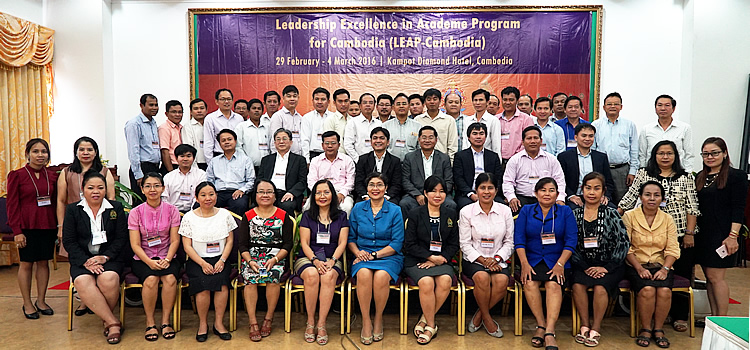Titled more popularly as LEAP-Cambodia, the five-day learning event draws from SEARCA’s staple offerings of regional learning events intended to build capacities of executives and leaders of agricultural higher education institutions in Southeast Asia. It traces its roots from the then Advanced Higher Education Administrator Development (AHEAD) course which SEARCA offered from 1993 to 2003. This earlier precursor of LEAP SEA had produced a total of 958 alumni who hold or have held key leadership positions in their respective universities.
This offering is dedicated to the specific needs of Cambodia to develop and nurture leadership in higher education in agriculture in the country. Dr. Gil C. Saguiguit, Jr., SEARCA Director, elaborated in his welcome remarks read by Dr. Maria Celeste H. Cadiz, Program Head for Knowledge Management, that LEAP Cambodia hopes to keep its participants abreast of the current challenges and opportunities in the context of their country, the Mekong Subregion, and Southeast Asia as a whole, and the corresponding leadership and management strategies that they may apply in managing their respective universities.
“We hope that your discussions and reflections throughout these five days will lead you to outdo your own past performance and offer agricultural education with its allied sciences to turn out promising leaders and practitioners in agricultural and rural development in Cambodia,” he addressed the academic executives present.
No less than His Excellency Dr. Touch Visalsok, Undersecretary of State of the Ministry of Education, Youth, and Sport (MOEYS), opened LEAP Cambodia. Citing the Cambodian Issue of the Second Edition of the Southeast Asian Agriculture and Development Primer Series that he authored as a SEARCA publication in process, Dr. Touch noted that based on previous studies, the increased production in agriculture correlates well with the expenses of the land. In the long run, this might not be sustainable. Developed countries depend on technological innovations to advance agricultural growth, he said. In Cambodia’s case, agricultural growth might be stagnant in the future. The yield will not increase even if agricultural inputs are increased because the yield has already reached its maximum and soul fertility has decreased.
Dr. Touch emphasized the need to work on total productivity factor for Cambodian agriculture. He stressed the need for very good and qualified human resources in agriculture. He said that LEAP Cambodia is a significant event because in order for Cambodian universities to produce good human resources, they need to develop good leaders in agriculture in higher education institutions first.
Hosts and main organizers of the event are the Directorate of Higher Education of MOEYS and the Royal University of Agriculture (RUA), SEARCA’s focal agency in Cambodia, represented respectively by Dr. Nith Bunlay, Deputy-Director General for Higher Education; and Dr. Seng Mom, RUA Vice Rector.
In his opening remarks, Dr. Bunlay exhorted the academic leaders present to actively participate in the forum so they can contribute positively to the development of their universities. He cited Japan as example of a country that has advanced agriculture owing to science and technology. He said that agriculture plays an important role in Cambodia’s gross domestic product (GDP) and there is a need to consider the empowerment and retooling of human resources in agriculture in the country.
Dr. Bunlay encouraged the participants to actively participate in the forum and take the initiative to work with MOEYS to increase the enrolment in agriculture courses in their universities.
LEAP Cambodia is led by high-caliber resource persons with Dr. Cely S. Binoya, Executive Director of the Asia-Pacific Association of Educators in Agriculture and Environment (APEAEN) as Technical Coordinator. Joining her are Dr. Suthad Setboonsarng, Member of the Board of Trustees of the International Rice Research Institute (IRRI) and respected economist in Thailand; Dr. Fay Lea P. Lauraya, President of Bicol University and Consultant of the Philippines Commission on Higher Education; Dr. Sar Chetra, Deputy Director-General of the Ministry of Agriculture, Forestry and Fishery in Cambodia; Dr. Ruperto S. Sangalang, Commissioner on Higher Education in the Philippines; Dr. Zita Mohd Fahmi, Deputy Chief Executive Officer (Quality Assurance) of the Malaysia Qualifications Agency; and H.E. Mr. Pen Sithol, Deputy Secretary General of the MOEYS Accreditation Committee. At SEARCA, Ms. Nova A. Ramos, Program Specialist; and Ms. Maria Cristina L. Decena, Office Assistant, are coordinating and supporting the implementation of the learning event in close collaboration with MOEYS and RUA counterparts in Cambodia. (Maria Celeste H. Cadiz and Nova A. Ramos)
